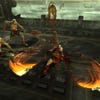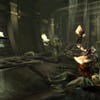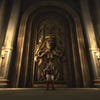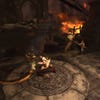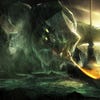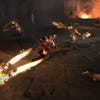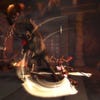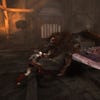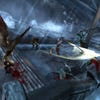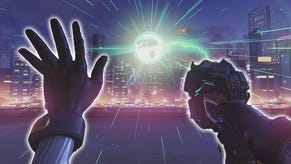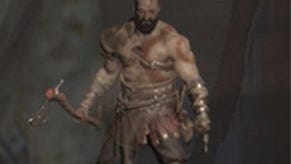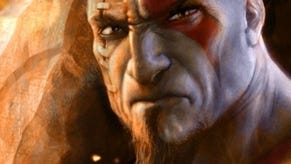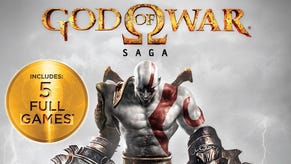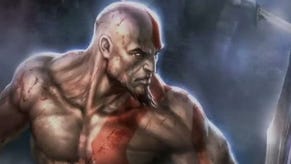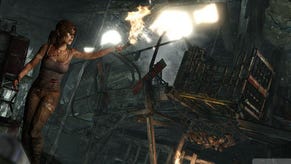Ready at Dawn Says Goodbye To PSP
Ru Weerasuriya on God of War: Ghost of Sparta and future plans.
Californian developer Ready at Dawn formed six years ago with the offer to go big with its own IP on PS3, but it has made its name on the PSP with the God of War series. Now, with the release of God of War: Ghost of Sparta, which managed a 7/10 in Eurogamer's review, the studio waves goodbye to Sony's handheld wonder.
Here, co-founder and creative director Ru Weerasuriya tells Eurogamer why Ghost of Sparta is the best-looking game on the system, defends the series from its critics, and reveals what's next for the ambitious studio.
Not too far, but at the same time you can take a few liberties. More than anything it's the gameplay mechanics that follow Kratos. That's the important part. That's the stuff you don't want to change, because you know how he fights, you know how he moves, you know what kind of person he is, and you don't want to deviate from that because otherwise you're bastardising the character – he's such a defined character.
Outside of that, we have a lot of freedom. If you look at all the five games now, every single game has taken a different freedom into doing what they wanted to do. In ours, we did that not only on the story side on both games, but also on the mechanics where we put mechanics in that are not in the other games. For example, navigation mechanics, underwater, and combat mechanics like the Hyperion Charge, which is brand new to the series.
You start with that formula. Like you said, you have this epic feel, with huge scenery, massive combat - you start with that formula and you know you have to translate that into whatever game you do.
Regardless of whether it's PSP, PS2 or PS3, if we were to run them let's say side by side on the PC, for example, they would need to feel the same. That we know. That's the reason why when we make the game we don't make it for PSP. We just make a great God of War game.
We end up translating it down to PSP and cramming it on that system. But we never should lose the feel the players expect. It is a hard thing to do because you know they want this expansive world, but you also know you don't want to have Kratos be this small [makes a pinch with fingers] on screen because the screen is so small.
You do find compromises. We work the camera system slightly differently than theirs [Sony Santa Monica]. We choose different perspectives to play the game in. We added new ways of playing Kratos, where you can, in one spot in Sparta, walk with Kratos. It's the first time you walk around with Kratos in a city. It's cool. You can deviate. Just like a movie, it's using different vehicles to deliver the same experience in the end.
They have a point. You can't just dismiss everybody's opinion and say, well, they don't get it. They do get part of it. They do understand also you need to refresh the things you do. You can't stick always to the same guns.
You can't deviate from that formula, the core, but you need to satisfy certain needs people have. I know from one game to the other, I also have certain things I would want to see in every single game, and it's not necessarily always the same experience, but it's always an addition to the experience.
One of the things people are talking about is it's so combat-centric and the story is not very much integrated into the combat. God of War III was fight after fight after fight after fight, which was entertaining. For me that's the experience I wanted.
We took an approach of, give them more of a movie-like experience, a more cinematic feel of how the game plays out. Story-wise we did that. We solved some of the issues. We heard people go, well I want to be more involved in the story.
Yeah, and also from the first game. We did for both games something different than they did. They have a trilogy: Kratos killing the gods. It's very much Kratos the god more than anything. When we approach our games it's more Kratos the man.
That's why in the first game I wanted to introduce the daughter and have that storyline between Kratos and the daughter – see the human side of who he is. We play off more of the motivations behind who Kratos is. Santa Monica plays on the results of his motivation.
Both our stories are way more personal than theirs. They admit that. They say that, too. The first one with the daughter and the second one with the brother - they are the two big motivations behind why Kratos does what he does, why he kills people and why he's become the man he is.
Yeah, I think it does. And also, one of the cool things with having five directors having directed five games is every single game, one way or the other, is different. You can't help but notice it. If you do play the game, yes the core experience is the same, but you do start realising that Dave [Jaffe] did something different than Corey [Barlog] did than I did than Stig [Asmussen] did than Dana [Jan] did.
We all have something we wanted to inject into that franchise. The reason why, as a game that has already had five iterations, the reason it still works compared to a lot of games out there that have a tendency to fluctuate and sometimes drop, is because we've had different people heading up the projects.


